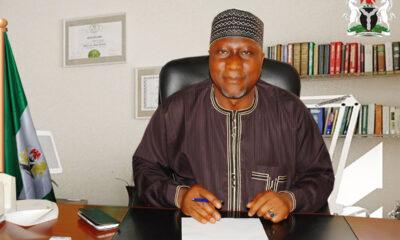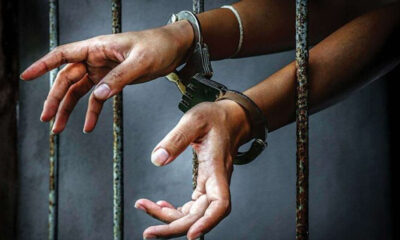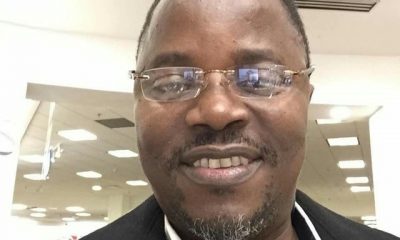Opinion
The god that cut soap for Wizkid (1)

The god that cut soap for Wizkid (1),
by Tunde Odesola
(Published in The PUNCH, on Friday, September 15, 2023)
This is the citation of Èsù, the Yoruba god of protection, benevolence, chief enforcer and messenger between heaven and earth: Èsù Láàlú, ògiri òkò, onílé kángun kàgun ọ̀nà ọ̀run, jọ̀wọ́ má yọjú s’ọ́rọ̀mi. Èsù Lároóyè, afi àdá olójúméjì tọrọ epo lọ́wọ́ ẹní lépo! Èsù má se mí, ọmọ ẹlòmíì ni o se.
If I successfully translate this panegyric into English word for word and Èsù, in gratitude, offers me his meal of boiled eggs, palm oil, bean cakes, pigeon and corn, placing it at the crossroads where three footpaths meet, I won’t dine with Èsù with the longest of spoons. It’s not that I’m afraid, it’s just that I’m watching my weight and height.
Translation: Èsù Láàlú, rock-solid, the owner of the ramshackle dwelling on the bumpy road to heaven, please, do not meddle in my affairs. Èsù Lároóyè uses a two-edged sword to beg for palm oil from the palm oil owner! Èsù, do not bewitch me, bewitch the child of someone else.
Courage can seize Èsù and make him command his disciples to fight for power, snatch, grab and run with it but inspiration falls like invisible dew on the insightful to birth breathtaking accomplishments.
Inspiration is a major step in the journey to discovery. Inspired in 1974 by the labyrinth that Ojúelégba, a Lagos district, was evolving into, Afrobeat superstar, Felá Aníkúlápó-Kútì, the Abàmì Èdá, reached for his saxophone, slung it over his shoulder and blew evergreen air into it, producing the album titled Confusion.
Forty years after Felá alluded to the higgledy-piggledy nature of Ojúelégba, popularly noted as the ‘paki’ end of the ‘buttie’ Surelere, Grammy award-winning superstar, Wizkid, sang Ojúelégba. Unlike Felá’s Confusion/Ojúelégba, which is a song of protest, Wizkid’s Ojúelégba is a song tracing his humble roots and the struggles of an emerging star.
In the beautiful song laid on melodious sound, Wizkid sings, “Ni Ojúelégba/They know my story/For Mo’Dogg Studio/I been hustle to work eeh/Ni Ojúelégba ooo/Me and Siddy/For Mo’Dogg Studio/We been hustle work eeh…”. He also hails the endless prayers of his mother, saying, “E kira fun mummy mi/ojojumo la n s’adura…”
READ ALSO:
-
FG backtracks, says no specific date for resumption of Emirates Flights
-
Biden’s two worst weaknesses exposed
-
3 sustain severe injuries as tanker rams into 6 vehicles on Lagos bridge
Despite his ruthlessness, Èsù was lenient with Felá and had been lenient with Wizkid aka Weezy, together with millions of Nigerians, especially Lagosians, who have been distorting his name for ages.
Ẹlẹ́gbà is another name for Èsù, among the Yórùbá. Though ‘ojú’ popularly means the eye. It also means arena, spot or shrine – like ‘ojúde oba’ or ‘ojúbo’. So, ‘Ojú Ẹlẹ́gbà’ means the Shrine of Ẹlẹ́gbà. And not Ojú Elégba, which means the ‘Arena of the flogger or cane seller’.
While some Yórùbá dialects refer to God as Eledumare or Eledua, some others refer to the Supreme Being as Olodumare. It’s the same case when some Yórùbá dialects refer to Èsù as Ẹlẹ́gbẹ́ra, both Ẹlẹ́gbà and Ẹlẹ́gbẹ́ra mean ‘rescuer’. It’s the Yoruba Bible writers who erroneously named Satan Èsù because of his penchant for mischief. The Yoruba god, Èsù, isn’t the same as the biblical satan. Èsù, in the Yoruba pantheon, is not a fallen angel. He never rebelled.
Aside from Ojúelégba, which is widely mispronounced in Lagos, Agbó-ti-kú-yò, a community in Agege, is another place that’s commonly mispronounced. The correct and full pronunciation is Agbó-ti-èkú-yò. Èkú is the mask/clothing of the masquerader. Indigenous Agege residents are reputed for celebrating masquerade festivals with masquerade groves widespread in the community. So, Agbó-ti-èkú-yò means someone happy to wear the masquerade. The masquerade is the mask or clothing or èkú, and the wearer of the masquerade is the masquerader.
Also, the seat of power in Lagos State, commonly referred to as Aláúsá, is wrongly pronounced. The right pronunciation is Aláùsá, the place or owner of walnut – because the area was formerly a walnut plantation.
Though the mind is the incubator of inspiration, it’s not wrong to say that the eureka of inspiration can be shouted in the strangest of places. A few days ago, I was having a telephone chat with a former colleague and retired popular broadcaster of the Osun State Broadcasting Corporation, Osogbo, Osun State, Folasade Odunlade, whom I’ve not seen in about a decade. “Tunde, Nigeria ma ti wa le gan,” she started in her unmistakable voice, going on to lament the level of insecurity nationwide. “Nowhere is safe o…,” she continued before she suddenly groaned in pain, “Ah! Ah! Ah! Ah! Iya Yetunde! Ah…,” I was alarmed. I thought her house was under attack. “Sade! Sade! Sade! Ki lo n sele!? The phone went dead.
I continued to call until she picked up. “Kilo sele, Sade?” I asked. It’s mama Wizkid?” “Mama Wizkid?”, do you know her? “Yes, I do,” she responded. “I’ve seen the news of her death earlier in the day, I’m sorry. It’s good that she witnessed the stardom of her son,” I consoled.
Sade wailed, “Sometime ago, she was ill but she recovered after treatment abroad. Her death caught me totally unawares. Our paths crossed around 2001/2002 when she was working at the National Commission for Museums and Monuments office located inside the Ataoja Palace, Osogbo. I was working at the OSBC. She was a Christian, though her husband is a Muslim. I had a shop, SIMAK Frozen Turkey and Chicken, beside Olive Branches Schools, Oke-Fia, Osogbo; she lived with her uncle, Baba Senjobi, a hotelier, next to my shop.
READ ALSO:
- NURTW president, 21 others arrested, moved to ex-SARS facility in Abuja
-
Police, Army, DSS destroy IPOB camp, shrine in Ebonyi
-
Pastor resigns after watching video of Kumuyi rallying support for Tinubu
“She was always going to Lagos every weekend because her husband and children were living in Lagos. We gisted almost every evening. She paid me visits at work while I paid her visits, too. In fact, she was the one who made me visit the Osun Osogbo Grove for the first time because I was initially afraid.”
Sade said the mother of three girls and one boy (Wizkid/lastborn) later got a transfer back to Lagos and they lost contact afterwards.
She explained that after she retired from OSBC, she took up the job of Special Assistant to the then Deputy Speaker, House of Representatives, Rt. Hon. Lasun Yussuff, in 2015.
“Iya Yetunde linked up with me in June 2015 before I became an SA to the deputy speaker. I didn’t know her son was the world-famous Wizkid. She was the one always looking for me. She found me and we continued with our friendship. She told me her son bought a car for her and that she went to church with it, and it was stolen at the church. She didn’t disclose Wizkid’s name then. I just thought it was just any other vehicle. And she didn’t specify the type.
“It was later when I discovered that Wizkid is her son that I restricted her visits to me because I was afraid she might be kidnapped, but she was so free, unassuming and humble. One time, I imported a popular poundo yam brand. The consignment was huge and I couldn’t sell them off on my own; she would come in her brand new Landcruiser and pack the poundo yam from my Magodo residence to Oyingbo, to help me sell them to Iya Alimi and other traders. I would have been in deep financial trouble if she didn’t help me sell the poundo yam off, using her own contacts. If she had a party, she would send her driver to come pick me up, and we would go together,” she said.
To be continued.
Email: tundeodes2003@yahoo.com; Facebook: @Tunde Odesola; X: @Tunde_Odesola.
. Published in The PUNCH, on Friday, September 15, 2023.
Opinion
Protests: Tinubu’s real troubles are just beginning, By Farooq Kperogi

Protests: Tinubu’s real troubles are just beginning, By Farooq Kperogi
In light of his planned astronomical hike in petrol prices euphemistically called “subsidy removal” in 2023, which his opponents also promised to implement and caused Nigerians embrace as inevitable and desirable, I foretold the imminent social convulsion that is gathering momentum across Nigeria now.
“I can assure Tinubu that if petrol price hikes deepen people’s misery, he’ll have a tough time governing,” I wrote in my April 29, 2023, column. I followed this up with more than half a dozen columns on the same theme.
When you remove subsidies from an all-important product like petrol that literally regulates every facet of life in a country like Nigeria, which also has the dubious honor of being in perpetual competition with India for the status of the world’s poverty capital, and then follow it up with a massive devaluation of the national currency even when the country is hopelessly import-dependent, you unleash existential demons that compel vast swaths of people to choose between life and death.
False assurances that the mass agony in the country is only temporary, or that the pains people are grappling with are mere precursors to future gains, or even that there is light at the end of the tunnel only aggravate people’s angst. There are two reasons for this.
One, most people know that based on past experiences in Nigeria (notably during IBB’s ruinous SAP, which Tinubu merely repurposed and renamed) and elsewhere in the developing world where the IMF and the World Bank dictate economic policies, there has never been a single example of these sorts of pains ever transforming into gains for the masses of the people.
Second, people outside the circles of power and privilege realize that the pains are being borne only by the poor. Tinubu, for example, bought a new presidential jet worth millions of dollars even before the spineless National Assembly had a chance to rubber-stamp it, as is now their wont, among other profligate expenditures amid a biting economic downturn.
People who are visiting darkness on the poor in the name of a deferred light at the end of the tunnel are glowing in incandescent bulbs of illumination. And the people are intelligent enough to know that what awaits them at the end of this disconsolate tunnel isn’t light. It’s an inferno. It’s a dreary snake pit of doom and gloom.
READ ALSO:
- Fuel queues return to Abuja, Ogun, Lagos, others
- Over 180,000 displaced from Gaza’s Khan Younis in four days – UN
- IGP says foreign mercenaries behind planned mass protest
When people come to this realization, no one needs to “sponsor” them to protest. The pangs of hunger they feel is sufficient to sponsor them to protest. The sensation of hopelessness that overcomes them is a bigger motive force for protest than the political machinations of any politician.
But even if it’s true that opposition politicians are taking advantage of the mass discontent in the country to cripple the government and delegitimize it for their self-interest, that’s not illegal. It’s an intrinsic element of democracies for opposition parties to seize on the missteps of incumbents to displace them.
President Tinubu is in power today precisely because he mastered the art of instrumentalizing the missteps of incumbents to advance his political aspirations. As recently as 2012, he “sponsored” a disruptive protest against former President Goodluck Jonathan that led to the deaths of protesters—for precisely what he is doing to Nigerians now.
No amount of persuasion or financial inducement of traditional rulers, religious clerics, union leaders, or activists will get people to make peace with needless suffering occasioned by a self-centered, hard-hearted implementation of vicious economic policies that snuff the life out of the people. Even if the planned protests are aborted, the predictable is only being postponed.
The only way Tinubu can retain legitimacy and earn the trust of the people is to reverse the deep, stinging hurt his policies have caused to the vast majority of our people. People are no longer interested in progress or the renewal of hope. They just want Tinubu to take them back to where he met them, which was not an enviable state. And that’s not too much to ask.
In a February 10, 2024, column titled “Hunger Protests: Why Tinubu Can’t Govern Like Buhari,” I said the spontaneous, hunger-induced eruption of seething communal anger in Minna, Suleja, Kano, and Osogbo were “a warning sign” that Tinubu couldn’t afford to ignore. He ignored it.
He is probably following the Buhari template of enacting unpopular policies and relying on the blind support of his worshipers to shield him from the consequences of his actions. But Tinubu has no such following, and I am glad he doesn’t, which is why I would hate for someone like Peter Obi or Rabiu Kwankwaso to be president.
They are political cult leaders with unthinking, fanatical followers who lose their damned minds if you as much utter the mildest critical remark about their gods, however factual it may be. Like Buharists, they have abdicated their senses to their political gods.
I reproduce here a portion of the column to remind Tinubu why he can’t benefit from the kind of immunity Buhari enjoyed:
“Had the current president been Muhammadu Buhari and not Bola Ahmed Tinubu, chances are that the worst that would happen amid the adversity people are going through now would be suppressed, barely audible murmurs. It’s because Buhari is a political cult leader with a firm grip on his followers who worship him and surrender responsibility for their lives over to him. Tinubu has no such appeal.
“A psychologist by the name of Steve Taylor came up with a concept he called ‘abdication syndrome,’ which he said disposes people to invest total, child-like trust in a political figure, a cult leader, an opinion molder, etc. in ways that mimic how children idealize and idolize their parents as unblemished paragons of perfection.
READ ALSO:
- Arsenal not giving up on Osimhen yet, make contact
- Bomb explodes in Yobe livestock market
- Let’s solve our problems, not to protest – VP Shettima
“According to Taylor, ‘abdication syndrome stems from the unconscious desire of some people to return to a state of early childhood, when their parents were infallible, omnipotent figures who controlled their lives and protected them from the world. They’re trying to rekindle that childhood state of unconditional devotion and irresponsibility.’
“Buhari is lucky to benefit from abdication syndrome in Muslim northern Nigeria, broadly conceived, which explains why he got away with murder for eight years. When he increased petrol prices by a steep margin in 2016, for instance, there were protests in Kano, Bauchi, and other places in SUPPORT of the increase and AGAINST people who planned to protest the increase. Nigeria had never seen anything like that before.
“Even protests against the unabating descent of northern Nigeria into a theater of bloodshed and abduction on Buhari’s watch provoked counter protests from people who have abdicated the use of their brains in the service of Buhari.
“Tinubu not only does not have the benefit of abdication syndrome anywhere in Nigeria, but he also has the misfortune of having to contend with a peculiar character of Muslim northern Nigeria: we feel the pain of, and react violently to, bad policies only when the policies are hatched and executed by people who have no filiation with our natal region.
“It’s no surprise that the hunger protests against the Tinubu administration started from and spread in the North.
“A powerful indication of Tinubu’s lack of firm emotional support base emerged when Osun, his state of birth where he lost the last presidential election to PDP’s Atiku Abubakar, became the first southern state to join the hunger protests. Should the resistance to his punishingly heartless neoliberal economic policies ignite a nationwide convulsion, the Southwest is unlikely to constitute itself as his bulwark.
“In fact, I hazard a guess that should Tinubu’s unfeeling policies activate the sort of destabilizing national upheaval that we saw in 2012 during Goodluck Jonathan’s administration, the Southwest won’t be aloof. It is likely to join in.
“And, of course, Tinubu is deeply unpopular in the Southeast, the South-south, and Christian northern Nigeria. In other words, Tinubu is essentially floundering into the most treacherous of social quicksands.
“His only fortification against danger is not just good governance but compassionate governance. The release of thousands of metric tons of grains is a good first step, but it’s not nearly enough to stem the tide of mass rebellion that is brewing in the country. At best, it will only delay the inevitable.
“The truth is that Nigeria can’t survive a total withdrawal of petroleum subsidies without an adequate, systematic, well-planned public transportation system. To do away with petrol subsidies, the government must first create conditions where car ownership and patronage of commercial transportation are a luxury.”
Protests: Tinubu’s real troubles are just beginning, By Farooq Kperogi
Farooq Kperogi is a renowned Nigerian columnist and United States-based Professor of Journalism.
Opinion
[ICYMI] Ilorin and Dan Fodio’s deadstock

[ICYMI] Ilorin and Dan Fodio’s deadstock
By Lasisi Olagunju
(Published in the Nigerian Tribune on Monday, 15 July, 2024)
Justice Ibrahim Kolapo Gambari, JCA became the Emir of Ilorin in August 1995 and decreed the ‘Kolapo’ in his name abolished. He said he should thenceforth be known and called Alhaji Ibrahim Sulu-Gambari; all former documents remain valid. He gave no reason for his decision but not a few of us thought it was his way of hiding the Yoruba content in the bloodstream of the House of Shehu Alimi, his Fulani roots. When Emir Ibrahim Sulu-Gambari took that unusual, surprising step, little did he know that the day would come when his aunt, Hajia Maryam, married to a king of Kano, and her sons would suffer discrimination and be tagged ‘Yoruba’.
It is the way of toads to detour into any available crater whenever it discovers it can no longer find its way to the stream. The chairman of the New Nigeria People’s Party (NNPP) in Kano State, Hashim Dungurawa, a few days ago addressed journalists in Kano and alleged that President Bola Tinubu was working hard to impose the deposed 15th emir of Kano, Aminu Ado Bayero, on the emirate because he shared same Yoruba background with the president. “If the President thinks he will use a few of his kinsmen in Kano and the alleged Bayero’s Yoruba lineage to continue to keep the deposed Emir Aminu Ado Bayero in the state, let him wait for 2027, we will show him that those people will not help him,” Dungurawa warned. When you heard his threats about 2027, you would think that Kano votes mattered in 2023. The votes were like rain water; they were surplus but they were wasted, unhelpful, unuseful to the person they were cast for. The same will happen in 2027.
The Kano NNPP man who spoke is not a lone wolf. He is a member of a preening pack that think themselves special and others of lesser breed. I understand what he voiced out has been in the whispering lips of the sands and boulders of Kano even before the emirship crisis unfolded. They call the deposed emir “son of the Yoruba woman.”
Around here, a child does not claim his father’s compound and disclaim his mother’s homestead. Aminu Ado Bayero is a grandson of the 8th emir of Ilorin; Aminu’s mother was a sister to the mother of the incumbent Ilorin emir. Ordinarily, this long line of Fulani ancestry should be a plus for whoever has it in the Fulani north, but in the peculiar politics of our feudal Nigeria, the Ilorin ruling family would only be recognized as ‘northern’ if they knew their limits. I hope they know now that they are fringe elements and fringe elements can never be allowed to dip their hands into the main bowl of the house.
Hashim Dungurawa, the NNPP chief who said loudly what was being said in whispers, is even said not to be a Fulani himself. He is said to be Hausa – the original owners of Kano before the Dan Fodio Jihad threw them into the sea of the barren street. Did you notice the irony here?
READ ALSO:
- BREAKING: Kano Assembly passes bill to establish second-class emirates
- Court dismisses Emefiele UK medial travel application
- Elon Musk to support Trump’s re-election with $45m a month
There is no ‘pure’ blood anywhere. It is 201 years this year that Afonja lost his ancestral throne of Ilorin to the children of Sheikh Alimi, his spiritual adviser and friend. In those two centuries, the children of Alimi, from generation to generation, have remained Fulani only by name, history and ancestry. Mohammodu Odolaye Aremu was a Dadakuada musical artiste of Ilorin ancestry. He died in 1997. He expended a great deal of his career years effusively singing the cultural and political histories of his city of birth for the careful to note and ponder on. Emir Mohammed Sulu-Gambari reigned in Ilorin from 1959 to 1992. He was the father of the present Emir Ibrahim Gambari. Odolaye waxed a record for the grand old man chanting his oríkì. He serenaded him “Alabi Òpó mo gbádùn oko mi ojo/ Súlú Oba gbogbo wa ní Ilorin…(Alabi Opo, I enjoy my lord / Sulu, our king in Ilorin). ‘Alabi’ is a personal Yoruba oríkì; the ‘Opo’ that follows it is the lineage panegyric (oríkì orílè). That lineage is Òpómúléró, the nearest English translation is ‘mainframe’. That is a lineage that feeds stubborn wine to stubborn child and proceeds to send that recalcitrant, drunk child to war. They proudly say they did it to Afonja who went to war never to come back:
Òpó tí ò gboràn, e kojú è síná
Iná tí ò gboràn, e kojú è sómi
Omi tí ò gboràn, baba wa ní á fi pon’tí
Otí tí ò gboràn, e f’ómo líle mu
Omo líle tí ò gboràn, e rán an rojú Ogun
Sebí Ogun náà l’Àfònjá lo tí ò fi padà wálé mó
Omo kèké ta dídùn, aso lèdìdì ènìyàn.
Emir Mohammed Sulu-Gambari was alive when Odolaye waxed his record and called him Alabi Opo. The emir did not ask the bard to shut up and did not say he wasn’t what he was called. He valued and enjoyed the Yoruba content of his existence so much that his children remained valued additions to the cultural assets of the land they inherited while maintaining their links to their paternal ancestors.
It is interesting that people who lost their ‘critical’ voices in the eight years of Muhammadu Buhari’s ruinous reign are now raising their chords. And, Tinubu, because he is a Yoruba man, is the whipping boy for the years of the Buhari locust. What they do with the successor to their Bayajidda II is what the Germans call “den Hund vor dem Löwen schlagen” – beat a dog before/for a lion. They think their throats should be the only expressway to heaven. Dungurawa’s snide broadside to the Yoruba was vilely divisive, provocative and unfortunate but his Kano and Ilorin victims must thank him (and his masters) for waking them up. They (the victims), at least, should be aware now that the butterfly may be winged and fly like a bird, but it is not a bird and won’t be allowed to enjoy bird privileges. It will be interesting to know how ex-emir Aminu, his brothers and sisters in Kano and their uncles in Ilorin took the statement from those they thought were their kinsmen- the authorities in Kano.
READ ALSO:
- JUST IN: Sanwo-Olu gives N100,000 each to Lagos Batch B Corps members
- Kano State Govt slams new charge on ex-Gov Ganduje
- Osun govt issues warning as scammers hack governor’s phone number
It is very interesting that for the Fulani North, because of the throne of Kano, Ilorin is no longer a Fulani town. God is great. But I commend them. It is always good to drop whatever is not yours no matter how long you’ve held on to it. Ilorin did not start as a settlement of the Fulani; the emirate there is a progeny of conquest. It is a victim of the characteristic Yoruba blind-fight for thrones. They fought and shredded their velvet, the Fulani picked it up and from it sewed an empire. The modern version of how 19th century Yoruba treated their heritage is what you see in Kano and Sokoto today. My friend in Kaduna told me that in Sokoto and Kano after the last elections, deposition of kings was the sole slogan: “Sabon Gwamna, Sabon Sarki” (new governor, new king). And they are working hard at it. That was the Yoruba misadventure that delivered Ilorin to Fulani forces in 1823/24.
There is an irony in some Kano people calling a prince or princess from Ilorin an outsider. The founder of Ilorin emirate, Sheikh Al-Salih (alias Shehu Alimi), was a Fulani who hailed from Tankara in present Niger Republic. It was from there he came to school in Bunza, present Kebbi State in today’s Nigeria. Just like him, Uthman Dan Fodio, the founder of the Sokoto caliphate, and by extension the emirate of Kano, was born in Maratta in the Tahoua region of today’s Niger Republic. An account said Alimi was a contemporary of Uthman Dan Fodio with Jibril bin Umar as their common teacher. But history did not say Alimi started out as a jihadist in the mould of Dan Fodio. He was a simple preacher and itinerant spiritualist who hawked his knowledge and power from one Yoruba town to the other. He was in Old Oyo, Iseyin, Ogbomoso and Kuwo before Afonja, a prince of Oyo, invited him to Ilorin in aid of his independence (rebellion) against his lord, the Alaafin. The rest is well recorded by history.
The more you read Ilorin’s well-documented history, the more you understand the tapestry of its ethnic configuration. There are tomes of materials available to the patient who is also curious to know. There is Ahmad b. Abi’s ‘Talifakhbar al qurun min Umara ‘ balad Ilurin’ (1912) with its critique by H. O. Danmole (1984). There is H.B. Hermon-Hodge’s ‘Gazetteer of Ilorin Province’ (1929). There is H. O. Danmole and Toyin Falola’s ‘The Documentation of Ilorin by Samuel Ojo Bada’. There is J.A. Atanda’s ‘The Fulani Jihad and the Collapse of the Old Oyo Empire’. There is also Stefan Reichmuth’s ‘Imam Umaru’s Account of the Origins of the Ilorin Emirate’ (1993); and then, Ann O’Hear’s ‘Elite Slaves in Ilorin in the 19th and 20th Centuries’ (2006). There are many more from local historians here and there.
READ ALSO:
- Kagame wins fourth term as Rwanda president with 99% votes
- JUST IN: Another Reps member, Ekene Adams, dies
- BREAKING: NECO releases 2024 examination results for Unity schools
Ilorin has the enviable luck of being a melting pot for all races, “tribes and tongues”. You find there people who would proudly say their ancestors were Fulani or Hausa or Kanuri or Dendi, Nupe, Baruba, Wangara, even Arabs. Yet, they are all ‘Yoruba’ today and they are proud to speak the language. You want to ask why the conqueror speaks the language of the conquered? It is because the Yoruba gene is very resistant to assimilation; the conquerors only got the throne, the soul refused to stay in their pouch. The Yoruba culture does what dams do to their surrounding environment. Their backwaters fester and consume their catchment areas. It is arguably the only African culture that survived slavery outside Africa. Go to Brazil, to Cuba and Trinidad and Tobago, Saint Lucia, Guyana, Haiti, Jamaica, about 200 years after slavery, descendants of Yoruba slaves there proudly raise the banner of their fathers. That is the case with the essential Yoruba-Ilorin.
While politicians in Kano are busy making identity nooses to hang their opponents, their street is dead drunk with tears of hunger and want. But the people rarely matter in matters like this. They won’t ever revolt; re-vote of their tormentors is what they will do. So, I have no dog in the bitter contest for the throne of Kano. The same should be our reaction to the machete attacks on the traditional powers and privileges of the Sultan of Sokoto by the state governor. At best, I watch events in those places the way I watched Sunday’s epic final of Euro 2024 football match between England and Spain. The Game of Thrones in the Fulani north, from Kano to Sokoto, is therefore, to me, entertainment. We run commentaries such as this only because, as the Yoruba say, it is always good to show the goopy snail that its eyes are caked with mucus.
Krishna Udayasankar, Singapore-based Indian writer and author of ‘3’ – a novel on the founding of Singapore, believes that “no empire lasts forever, no dynasty continues unbroken” How is the Kano kingship crisis going to end for the ruling class in northern Nigeria? When you combine what is happening in that city with the simmering volcano in Sokoto, would you be wrong if you say the signs portend sundown for the elaborate empire built by Dan Fodio in the first decade of the 19th century? No intervention can save that empire from itself. Maybe that elaborate realm has to die for Nigeria to live and thrive.
While the battle for thrones rages on, the Dan Fodio clan got a whole ministry from Tinubu last week. The president called it the Ministry of Livestock Development. I heard their elites’ happy footfalls. Who told the Fulbe that their problem would be over with a special ministry for their cows? Something tells me they know too that they are only interested in the billions that will be pumped into that loss centre. My dictionary says the opposite of livestock is deadstock. Something tells me that is the fruit from that luxuriant tree unless they change their ways. But they won’t change. For them, it is already past midnight.
[ICYMI] Ilorin and Dan Fodio’s deadstock
Opinion
Farooq Kperogi : LGBTQ storm in $150bn Samoa deal teacup

Farooq Kperogi : LGBTQ storm in $150bn Samoa deal teacup
In the last two days, my social media feed has been suffused with impassioned expressions of grief and outrage from Nigerians over a putative June 28 agreement that the Nigerian government has signed with the European Union to legalize LGBTQ+ rights in the country in exchange for a $150 billion economic package.
It turned out that a July 4 Daily Trust titled “LGBT: Knocks As Nigeria Signs $150 Billion Samoa Deal” might be the source of the cultural and social anxiety that Nigerian are expressing about Nigeria becoming an “LGBTQ+ nation,” as someone put it on social media.
Unfortunately, the Daily Trust story failed to cite the portion of the Samoa agreement that mandates Nigeria to change its laws to accommodate LGBTQ-friendly policies. It based its headline and entire story on an unnamed report without even citing evidence from the report.
“The agreement reportedly has some clauses that compel underdeveloped and developing nations to support the agitations by Lesbian, Gay, Bisexual, and Transgender (LGBT) community for recognition, as condition for getting financial and other supports from advanced societies,” it wrote.
The paper then proceeded to fish for people who would express fury and consternation over a piece of information that it hasn’t originally seen, and these expressions of fury and consternation created a self-reinforcing loop. We call this circular reporting.
Circular reporting, also called false confirmation, occurs when a source contrives a piece of information, repeats the information to multiple sources in the form of interviews (in the case of journalism), and then cleverly passes off the views of the interviewees as the original source of the information. It’s basically creating something from nothing.
I read the 12-page agreement titled “The Samoa Agreement with African, Caribbean and Pacific States” that is posted on the website of the European Parliament. There is no obligation in the agreement that requires African, Caribbean, and Pacific countries adopt LGBTQ rights.
READ ALSO:
- No guy has toasted me in five years, UK-based lady laments scarcity of men
- [UPDATED] Euro 2024: Spain knock out hard-fighting Germany 2-1, hit semi-finals
- Spate of attacks, kidnapping worry Afenifere, seeks review of security architecture
However, page 2 of the document states, “The chapter on human rights should explicitly list the forms of discrimination that should be combated (such as sexual, ethnic, or religious discriminations) and mention sexual and reproductive rights.”
Even so, there is an admission in the document that several countries, including European Union members, are resistant to enshrining “sexual rights” in their legal codes.
On page 5, for instance, we see the following: “As of 22 November 2023, however, 30 OACPS members, mostly African and Caribbean, had failed to sign…. Some leaders explained they wanted to check whether the agreement would be compatible with their legal order, notably as regards same-sex relations and sexual health and rights.
“This move surprised several commentators, as the wording on these topics does not go beyond existing international agreements…) and was agreed after years of negotiation; in addition, the agreement includes the possibility for the signatories to make interpretative declarations or reservations.”
Again, page 8 of the agreement notes that not only African, Caribbean, and Pacific countries but also some European Union members resisted being bludgeoned into agreeing to LGBTQ+ rights.
It says, “While the parties will commit ‘to promote, protect and fulfil all human rights be they civil, political, economic, social or cultural’, some ACP states were reluctant to see the foundation agreement mention sexual orientation and gender identity (LGBTI rights) – an issue on which there are also differences among EU Member States.
“As a matter of compromise, the parties will commit to the implementation of existing international agreements – notably the International Conference on Population and Development Programme of Action on sexual and reproductive health and rights, the Beijing Platform on gender equality and their follow-up (negotiated agreement, Article 36). The wording however falls short of the EU negotiators’ ambitions,” the document says.
Further down on page 9 of the document, it was made certain that the European Union was unable to universalize the merit of protecting sexual health. “Access to sexual and reproductive health services and information will be promoted – without further details, as the parties have varying views on this concept.”
READ ALSO:
- Israeli team led by spy chief Barnea meets Qatari mediators on Gaza deal
- Four suspected vandals of TCN facilities arrested in Kaduna
- Stop posting camp activities on social media, NYSC DG warns Corpers
In other words, although the European Union did want to get countries in Africa, the Caribbean, and the Pacific to embrace an expansion of the notion of human rights to include sexual minorities, they got a sustained pushback, not only from them but also from some European Union members.
The only rights that Nigeria and other countries agreed to in the Samoa Agreement are the rights they have already been signatories to for years such as the African Charter on Human and Peoples’ Rights, the International Covenant on Civil and Political Rights (ICCPR), the International Conference on Population and Development Programme of Action, and the Beijing Platform.
Plus, a provision in the agreement, which states that countries that signed the agreement have the latitude to “make interpretative declarations or reservations” about controversial issues means that they can understand “sexual discrimination” in ways that suit their cultural peculiarities and existing laws.
Anyone who takes the trouble to actually read the 12-page agreement would know that our lazy, stenographic news media ecosystem has merely created a storm in a teacup. In addition to the reality that the cultural soil in Nigeria is too inhospitable for the seeds of LGBTQ+ rights to germinate, much less flourish, no halfway sane Nigerian politician would risk irrecoverable political, social, and symbolic self-diminution by signing an agreement that violates an existing domestic law, i.e., the Same Sex Marriage Prohibition Act, and that causes extreme anxiety in a cultural conservative country like ours.
In all this, my major worry is that Nigerians waste precious emotions and expend tremendous amounts of energy over issues that are really of no consequence to their everyday lives but look away when threats that smolder their souls and annihilate their very existence confront them. The World Bank and the IMF routinely give loans to Nigeria and attach punishing conditionalities to them.
The removal of subsidies on everything, the devaluation of the naira, the shrinking of expenditure on education and health, etc. are some of the conditions these evil institutions attach to the loans. Someone close to people in power told me a few days ago that Tinubu’s resistance to the IMF’s insistence that he increase petrol price has dissipated and that it’s a matter of when, not if, he’ll approve a price increase of over N1,000 a liter.
When that happens, people will merely grumble, thicken their skins, make peace with their suffering, and move on. So long as LGBTQ+ people have no rights, so long as our religious and cultural values are respected, it doesn’t matter if the IMF and the World Bank instruct our leaders to murder us piecemeal.
That’s why people in positions of power will perpetuate their dominance of society and sustain their oppression of the people intergenerationally. They know that most people are governed by their emotions, not their intellect, by their hearts, not their heads.
The day Nigerians are as engaged and as enraged as they are about this non-existent LGBTQ+ conditionality in a European Union economic package as they are about the IMF’s and the World Bank’s conditionalities that ensure that our people continually live at the subhuman level is the day true liberation will start.
Farooq Kperogi : LGBTQ storm in $150bn Samoa deal teacup
Farooq Kperogi is renowned columnist and United States-based Professor of Journalism.
-

 News3 days ago
News3 days agoNLC can’t withdraw from protest it didn’t organise – Ajaero
-

 News3 days ago
News3 days agoMinimum wage: Akpabio says domestic workers can’t earn less than N70,000
-

 News1 day ago
News1 day agoIslamic scholars warn parents, schools against skipping Primary 6
-

 International1 day ago
International1 day agoNetanyahu, Biden hold talks over tense Gaza ceasefire
-

 News3 days ago
News3 days agoFG unveils training programme for 1,000 Nigerians in AI, blockchain
-

 metro2 days ago
metro2 days agoNERDC Executive Secretary Prof Ismail Junaidu slumps, dies
-

 metro3 days ago
metro3 days agoPastor remanded for allegedly defiling teenager, attempting abortion
-

 metro3 days ago
metro3 days agoMan, 24, jailed 14 years for raping 6-year-old girl in Ekiti













